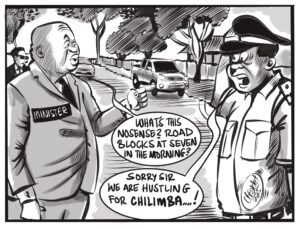Going by the LOCAL GOVERNMENT ADMINISTRATION CIRCULAR No. CDF001 OF 2022, dated 20 January 2022, the Secondary School Bursary has started happening.
The Circular has been addressed to the country’s 116 Town Clerks and Council Secretaries and the 156 Chairpersons of the Constituency Development Fund Committees (CDFCs). And the subject matter of the Circular is:
INTERIM GUIDELINES FOR THE IMPLEMENTATION OF THE SECONDARY SCHOOL BURSARY UNDER THE CONSTITUENCY DEVELOPMENT FUND (CDF)
The contents of the Circular are as follows:
“2. As you may be aware, Government increased the allocation of the CDF from K1.6 million to K25.7 million per Constituency in the 2022 National Budget. The increased allocation is intended to provide for an increased scopeof the CDF to include the Community Projects, Youth and Women Empowerment and Secondary Boarding School and Skills Development Bursaries.
“3. The Secondary Boarding School and Skills Development Bursaries have been allocated 20 per cent of the total CDF amount per Constituency. With respect to secondary school boarding bursary, Government’s policy is to provide support to orphans and vulnerable children through the CDF.
“4. As Government is finalising the CDF Guidelines, interim measures have been put in place to facilitate the implementation of the Secondary School Boarding Bursary to cover boarding fees.
“5. The identification and selection of learners shall be carried out at secondary boarding school level and community level through the WDCs. Identification of learners shall be as follows:
“A. Secondary Boarding School Learner Identification and selection: The existing Orphans and Vulnerable Children Selection Committees established at various schools under the Ministry of Education to identify and select eligible children shall be used. The membership is provided at Annex A. The identification, selection and recommendation of eligible learners shall be as follows:
“(i) The Committee shall identify, select and recommend eligible learners for the bursary using the criteria at annex B of this Circular.
“(ii) The Committtee shall submit a consolidated list of recommended learners to the School Head Teacher;
“(iii) The Head Teacher shall submit the list to the District Education Board Secretary (DEBS) for onward transmission to the respective Local Authority for payment; and
“(iv) The Local Authority shall upon receipt of the consolidated list provide a report to the CDFC and the WDCs, indicating personal details, grade and fees paid for selected eligible learners.
“(b) Community level learner identification and selection: The identification and selection of eligible learners at community level shall be as follows:
“(i) Eligible learners shall submit a duly completed application form (see Annex C) for bursary to the WDCs with the school acceptance letter;
“(ii) The WDC shall submit a consolidated list of names of eligible learners to the CDF Committee; and
“(iii) The CDF Committee shall submit a consolidated final list of selected learners from the Constituency to the Local Authority for processing of payments.
“6. Addressees are hereby directed to adhere to the contents of this circular and ensure that the substructures under their jurisdiction are sensitised for immediate implementation. Detailed CDF Guidelines will be issued by the Minister of Local Government and Rural Development.
“7. By copy of this circular, Ministries of Education and Finance and National Planning are requested to inform their subordinate structures to comply with the contents of this Circular accordingly.”
(signed by Wisdom Bwalya, Permanent Secretary (TS), Ministry of Local Government and Rural Development, 20 January 2022)
INCREASED AMOUNT AND SCOPE THE CDF
Government introduced the Constituency Development Fund (CDF) to promote community development projects. As at last year, 2021, the amount that was given to each Constituency was K1.6 million. In the 2022 National Budget the allocation of the CDF has been increased sixteen-fold, from K1.6 million to K25,739,910.
The increased amount of the CDF is now not just limited to the development of the communities. It includes the development of the people. And EDUCATION is a development of the people. In this regard, secondary education and skills and lifelong development, including bursaries, have been allocated 20% of the total amount. This translates to about five million and seventy-eight thousand three hundred and seventy-two kwacha (K5,078,372).
Families that have been struggling to keep their children in school now have a sigh of relief. In our society there are many orphans and vulnerable children. “With respect to secondary school boarding bursary, Government’s policy is to provide support to orphans and vulnerable children through the CDF.” The guidelines clearly state this, in black and white.
This increase in the scope of the CDF has now generated a lot of interest in local communities in the existence and use of the CDF. People are now interested in how it is being disbursed and how much is being disbursed. CDF has now become a community issue. This also is a development of the people.
For a long time since its introduction the CDF was regarded as monies of the Members of Parliament (MPs). The MPs had an upper hand in deciding how it should be used. They made the constituents believe that the products of the CDF were a benevolence or kindness of their MPs. Even today some MPs want the electorate to regard the CDF as such.
Sorry comrade MPs, this is not the case anymore. People now know and understand that CDF is a government programme.
LESSON TO POLITICIANS AND POLITICAL PARTIES
Dear Politicians,
So it is possible to make promises and fulfil them! Why have we all along been made to believe that politicians and political parties just make campaign promises in order to win our votes, but they actually do not mean what they say?
We wish to take this opportunity to thank the New Dawn Government of the UPND Alliance for demonstrating to us that politics and winning elections are about SERVICE TO THE PEOPLE.
The United Party for National Development (UPND) has demonstrated that a political party can believe in an issue, articulate that issue, use the issue during campaigns, and implement that issue after winning the elections.
What has distinguished the UPND from other political parties is that from its inception in 1998 is has been championing FREE EDUCATION. The founding President of the UPND, Mr. Anderson Mazoka, many times talked about the desire of the UPND to be in government to offer free education to the children of Zambia.
A few days after Anderson Mazoka died, this author wrote an article, which was titled: MAZOKA’S VISION. Below is an extract from that article:
“Here are a few things that were dear to his heart. Mazoka wanted UPND to take over the governance of the country in order to provide free education for the Zambian people. He ‘said UPND was still interested in educating the Zambian child and that every child, whether poor or orphaned, should go to school’ (The Post, 13 February 2006). This was for real because he understood the significance of education. He was himself highly educated, and this made him appreciate the importance of education both to the development of the individual and the development of the nation,” (Simon Kabanda, 30 May 2006).
The UPND has consistently been passionate about the importance of education.
Six weeks to the 12 August 2021 elections, as we reflected on the plight of unemployed trained teachers, we made the following observation:
“The situation of unemployed trained teachers is going to be salvaged by a sound political decision that is going to be made by political leaders who value education. The good policy, the good practice, of including a provision for teacher-recruitment in the national budget, must be brought back, starting with the 2022 national budget”, (Simon Kalolo Kabanda, 28 June 2021).
So, what is happenning now is POLITICAL WILL at work.
Yes. The secondary school bursary has started to happen. And this is because of the political will of selfless politicians who value education.
(If you have any socio-political question that you would like to be discussed on this column, kindly send a message to me either through SMS, WhatsApp or email).
About the Author
Simon Kalolo Kabanda is a Human Rights and Development Consultant. He is also an analyst of governance and socio-political developments
Whatsapp: +260-761-206353
Email: [email protected]
25 January 2022
























